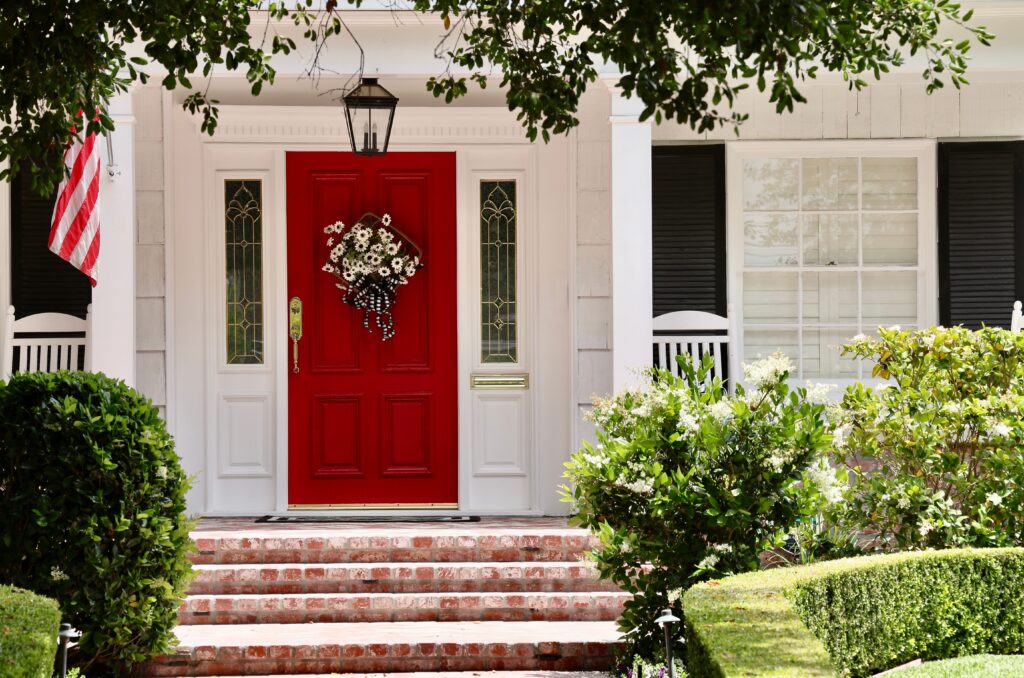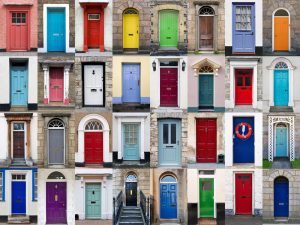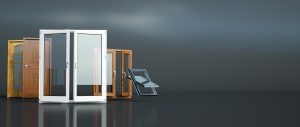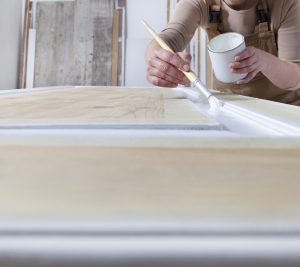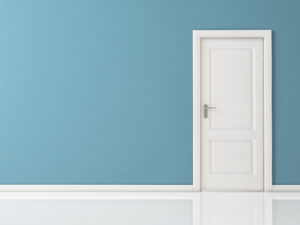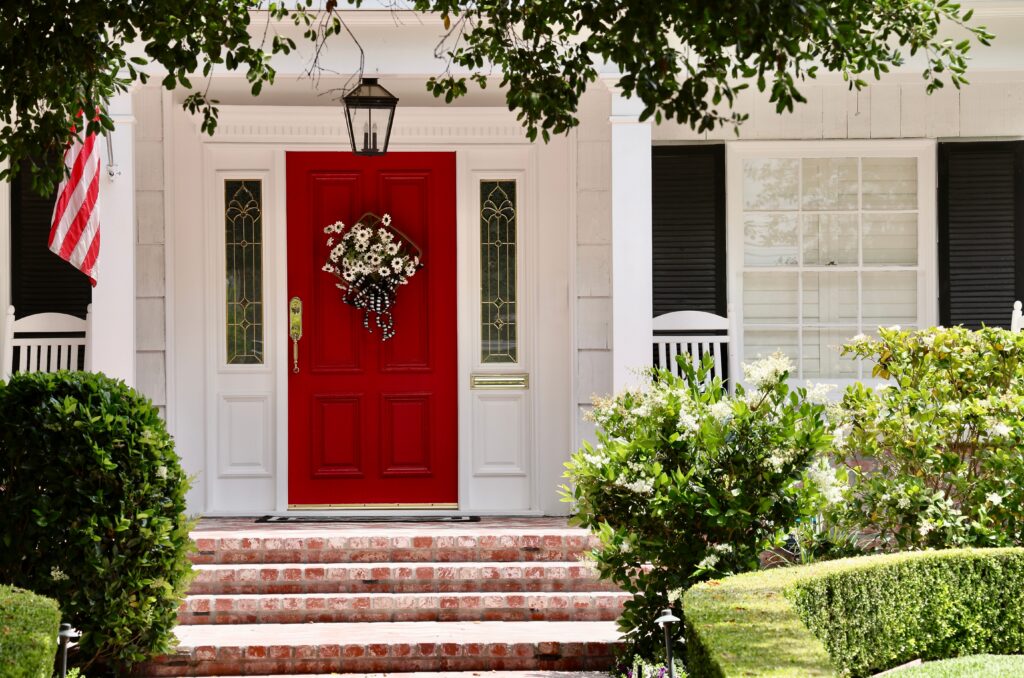
Replacing your front door isn’t just a cosmetic upgrade. It’s a practical investment that improves home security, increases energy efficiency, and adds measurable curb appeal. A well-chosen door can reduce utility bills by sealing air leaks, offer better protection against intruders, and enhance your home’s overall appearance.
Whether you’re dealing with a warped, weathered entryway or planning a full exterior update, the right replacement door makes a noticeable difference. This guide breaks down your options, typical costs, material pros and cons, and what to expect during installation so you can make a confident, informed decision.
Table of Contents
What You’ll Pay: 2025 Average Front Door Replacement Costs
The cost to replace a front door depends primarily on the door material, style, and whether you choose professional installation. Most homeowners should budget for both materials and labor unless they have advanced DIY skills.
According to recent data from HomeGuide’s cost research, the typical price range for front door replacement in 2025 is:
- National average cost: $1,100–$1,700 (including installation)
- Budget options: $500–$900 (basic steel doors with minimal features)
- Mid-range options: $900–$2,500 (quality steel or fiberglass doors)
- Premium options: $2,500–$10,000+ (high-end fiberglass, wood, or iron doors with decorative elements)
Here’s what affects these costs:
- Door material (steel, fiberglass, wood, or iron)
- Size and configuration (standard vs. custom dimensions)
- Additional features (glass inserts, sidelights, transoms)
- Hardware quality (basic vs. premium locks and handles)
- Installation complexity (simple replacement vs. structural modifications)
Door System Types and Their Costs
Front door replacement projects typically fall into one of these categories:
| Project Type | Average Cost Range (Materials + Installation) |
| Single door replacement (same size) | $500–$1,600 |
| Door with sidelights | $1,600–$4,600 |
| Double front door | $1,500–$5,000 |
| Custom door installation | $4,000–$10,000+ |
Professional installation typically adds $230–$1,300 to your door cost, depending on complexity and your location.
Choosing the Right Door Material
Your door material choice will impact appearance, durability, maintenance requirements, and energy efficiency. Each option offers distinct advantages for different climates and home styles.
Steel Doors
Steel doors account for about 65% of the front door market due to their excellent value, security benefits, and relatively low maintenance requirements.
Average cost: $500–$2,000 installed
Key benefits include:
- Highest security rating among common door materials
- Excellent return on investment (up to 188% according to Remodeling Magazine’s Cost vs. Value report)
- Good energy efficiency (R-values of 5–6 with foam insulation)
- Lower maintenance than wood doors
- Available in various styles and finishes
Potential drawbacks:
- Can dent or scratch (though repairs are possible)
- May transfer temperature in extreme climates
- Susceptible to rust if the finish gets damaged
- Fewer style options than wood or high-end fiberglass
Steel doors work particularly well in areas where security is a priority or in climates without extreme temperature fluctuations.
Fiberglass Doors
Fiberglass has become increasingly popular for its durability and versatility. These doors can mimic the appearance of wood without the associated maintenance concerns.
Average cost: $1,000–$4,000 installed
Key benefits include:
- Excellent energy efficiency (R-values of 5–7)
- Highly resistant to dents, scratches, and environmental damage
- Available in realistic wood-grain textures or smooth finishes
- Minimal maintenance requirements
- Ideal for harsh climates (hot, humid, coastal areas)
- Won’t warp, rot, or rust
Potential drawbacks:
- Higher initial cost than steel
- Less structural strength than steel for security
- Mid-range ROI (about 50–77%)
- Can crack under severe impact
According to the Department of Energy, fiberglass doors with polyurethane foam cores provide up to five times the insulating value of solid wood doors, making them ideal for energy-conscious homeowners.
Wood Doors
Wood doors remain popular for their natural beauty and classic appeal, particularly for historic homes or traditional architectural styles.
Average cost: $2,000–$5,000 installed (standard) $5,000–$10,000+ (custom or exotic woods)
Key benefits include:
- Unmatched natural beauty and warmth
- Easily customizable with carvings and details
- Can be repaired and refinished multiple times
- Available in countless designs and wood species
- Authentic complement to historic homes
Potential drawbacks:
- Requires regular maintenance (refinishing every 1–3 years)
- Less energy efficient (R-values of 2–3)
- Susceptible to warping, cracking, and rotting
- Higher long-term maintenance costs
- Performance varies significantly by wood species
For the best results with wood doors, the National Association of Home Builders recommends installing them in protected areas (under porches or overhangs) or using them with storm doors in harsh climates.
Wrought Iron Doors
Iron doors represent the premium segment of the market, offering distinctive styling and maximum security.
Average cost: $3,000–$15,000+ installed
Key benefits include:
- Exceptional security and durability
- Striking, high-end appearance
- Extremely long lifespan (60+ years with maintenance)
- Unique, often handcrafted designs
- Potential to increase property value for luxury homes
Potential drawbacks:
- Highest initial cost
- Heavy (may require reinforced framing)
- Requires periodic maintenance to prevent rust
- Lower energy efficiency unless combined with other materials
Professional vs. DIY Installation
While DIY door installation can save on labor costs, it requires specialized skills and tools to ensure proper fit, security, and weather sealing.
When Professional Installation Makes Sense
Professional installation typically costs $230–$1,300 but offers significant advantages:
- Expertise in weathersealing and security setup
- Proper handling of unexpected issues (hidden damage, structural problems)
- Warranty protection (many manufacturers require professional installation)
- Time efficiency (typically completed in 3–8 hours)
- Proper disposal of old materials
Professional installation is strongly recommended if:
- Your door frame shows signs of damage or rot
- The project involves sidelights or transoms
- Your home has settled, creating an uneven opening
- You’re installing a high-end or custom door
- You want to maintain manufacturer warranties
- You’re concerned about proper energy efficiency
DIY Installation Considerations
If you have advanced carpentry skills and proper tools, DIY installation can save $230–$1,300 in labor costs. However, you should only attempt this if:
- You’re replacing a standard-sized door in good condition
- No structural modifications are needed
- You have experience with precise measuring and leveling
- You have at least one helper (doors are heavy and awkward)
- You understand weather sealing techniques
- You’re comfortable with potential warranty implications
DIY installation typically takes 1–2 days for those with basic carpentry skills, compared to half a day for professionals.
Smart Ways to Save on Your Door Replacement
While quality should remain your priority, these strategies can help reduce your overall project cost:
Timing Your Purchase
- Shop during off-peak seasons (October–February)
- Look for holiday sales (Memorial Day, Labor Day, Black Friday)
- Check for end-of-year clearance events (potential savings of 15–25%)
Door Selection Strategies
- Consider a pre-hung door (includes frame and hinges) for easier installation
- Opt for standard sizes rather than custom dimensions
- Choose simpler glass designs if including decorative elements
- Select door styles that compliment your home without excessive details
Installation Savings
- Bundle multiple door replacements to reduce per-door labor costs (15–20% savings)
- Reuse hardware if your existing handles and locks are in good condition
- Get at least three quotes from reputable door installation companies
- Ask about remnant or display models at showrooms (potential 30–50% discount)
Energy Efficiency Rebates
- Look for ENERGY STAR certified doors that may qualify for rebates
- Check your utility company for energy efficiency incentives
- Research federal and state tax credits for energy-efficient home improvements
According to Angi’s cost research, getting multiple quotes can save 20–40% on identical work.
Return on Investment (ROI)
Front door replacement consistently ranks among the home improvements with the highest return on investment. According to the Remodeling 2024 Cost vs. Value Report, steel entry doors offer an exceptional ROI of approximately 188.1% at resale.
ROI varies by door material:
- Steel Doors: 100–188% ROI
- Fiberglass Doors: 50–77% ROI
- Wood Doors: Variable, typically lower than steel
Beyond direct financial returns, a new front door provides:
- Improved energy efficiency (potential 5–10% reduction in energy costs)
- Enhanced security with modern locking systems
- Increased curb appeal (can boost overall property value by 7%)
- Reduced maintenance costs compared to older doors
FAQs
How long does a front door replacement take?
Professional installation typically takes 3–8 hours for standard doors and up to 1–2 days for complex installations with sidelights or structural modifications. DIY installations generally take 1–2 full days.
How often should I replace my front door?
Most quality front doors last 15–30 years. Consider replacement if you notice drafts, visible damage, difficulty opening/closing, or outdated styling that affects your home’s appearance.
Do I need a permit to replace my front door?
Most simple replacements using the existing opening don’t require permits. However, if you’re enlarging the opening, changing the configuration (adding sidelights), or making structural changes, local building codes typically require permits. Check with your municipal building department before starting your project.
What’s the most secure front door material?
Steel doors provide the best security for most homes, with wrought iron offering premium security at a higher price point. Look for doors with solid cores, multi-point locking systems, and reinforced strike plates for maximum security.
Are energy-efficient doors worth the extra cost?
Yes. Energy-efficient doors with proper weatherstripping can reduce energy costs by 5–10%. In cold climates, the energy savings typically recoup the additional cost within 2–5 years, with continued savings thereafter.
Conclusion
Replacing your front door is a smart, high-ROI improvement that enhances your home’s appearance, strengthens security, and boosts energy performance. Among the available options, steel and fiberglass doors typically offer the best long-term value with minimal maintenance and strong durability.
Before you commit, take the time to measure your current entryway, explore door styles that suit your home’s character, and get detailed estimates from at least three qualified installers. With a thoughtful approach and quality materials, your new front door can deliver lasting benefits in both comfort and curb appeal.
To make the most of your investment, consult with licensed professionals or request multiple quotes from trusted door installers in your area. A side-by-side comparison of materials, warranties, and labor costs will help you choose the best door for your budget and long-term needs.

Anna has over six years of experience in the home services and journalism industries and serves as the Content Manager at MyHomePros.com, specializing in making complex home improvement topics like HVAC, roofing, and plumbing accessible to all. With a bachelor’s degree in journalism from Auburn University, she excels in crafting localized, comprehensive guides that cater to homeowners’ unique needs. Living on both coasts of the United States has equipped her with a distinctive perspective, fueling her passion for turning any house into a cherished home through informed, personalized decision-making.
Connect with top-rated local contractors who can help you with siding, roofing, HVAC, windows, and more. Get free quotes from verified professionals in your area today.

